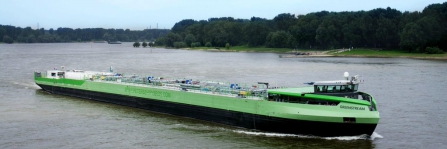RWE, Duisburg Port to Promote LNG
The original early 2017 article below is updated by a final sentence as of early 2018.
German utility RWE and the Port of Duisburg have committed to jointly create the necessary infrastructure to use LNG in the port of Duisburg, the world’s largest inland port. Initially they will work together solely on replacing diesel with LNG in vehicles used by the inland port.
Some €0.5mn will be spent on a mobile LNG fuel pump that can be relocated where needed, and on conversion in a pilot phase of port vehicles to LNG (replacing diesel), the two firms said January 4.
In the longer run though, RWE hopes that not only port vehicles and lorries, but also vessels and even trains in the densely-populated surrounding Rhine-Ruhr region may use LNG as a transport fuel.
Further downstream along the Rhine in the Netherlands, LNG is actively promoted by various firms at inland and sea ports. It flows into the sea at Rotterdam. Separately in Belgium the Port of Antwerp and Engie last year agreed to develop a hub for refuelling both inland and coastal vessels; Zeebrugge too supplies LNG to small users.

Greenstream, operating downstream in the Netherlands, is the first fully LNG-powered barge operating in northwest Europe (Photo credit: Shell, via Twitter)
Update as of January 4 2018: The above LNG infrastructure project of RWE Supply & Trading, the Port of Duisburg, and now also University of Duisburg-Essen has received an EU grant of over €740,000 from the European Regional Development Fund. The joint project will start in January 2018 and has a term of 29 months and is planned to cost €1.5mn.
Mark Smedley




